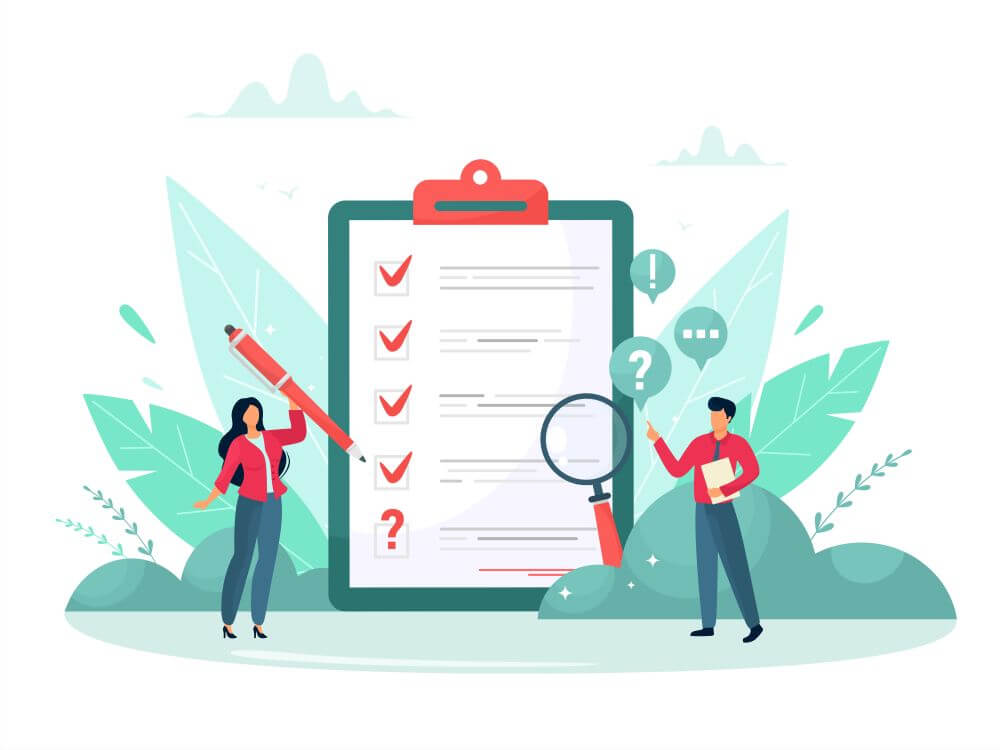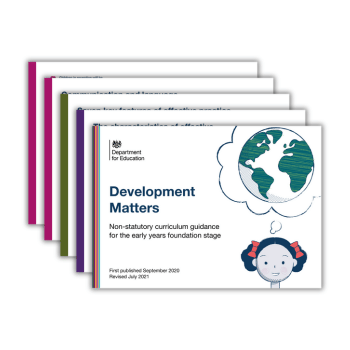128-page Development Matters PDF
Early Years, KS1
Years R-1
Development Matters 2021 features guidance on how children develop and learn. It has been designed for all early years practitioners, whether you’re a childminder or work in a nursery, school nursery or Reception class.
The guidance will help you to meet the requirements of the EYFS statutory framework.
Development Matters 2021 – what the guidance means for you

Development Matters 2021 focuses on the professional opinion of EY staff over progress data, explains Stephen Kilgour…
The new Development Matters was launched in September 2021, alongside the updated statutory EYFS Framework.
One of the clearest messages in the new guidance was that we should no longer be collecting and analysing detailed progress data about each child. This was a big change which required some careful planning.
Professional judgement on children’s development
We’d all been using the previous DM since 2012. It provided considerable structure and direction for managing children’s progress. It’s fair to say that for some of us, marking off statements and assessing against ‘age bands’ felt like a comfort blanket.
“We should no longer be collecting and analysing detailed progress data about each child”
Also, if you qualified since 2012, the previous DM was the only style of assessment in practice you’d known. The significant changes to the guidance caused plenty of debate, as well as anxiety about what new systems would look like.
Development Matters 2021 is underpinned by child-centred assessment and based on a belief in the professional judgement of the EY workforce. This is a positive development, but after many years of very structured systems, it felt daunting.
This is because it meant that all those working in Early Years needed to have a solid understanding of child development and feel confident enough to rely on their own judgement.
Although change can cause concern, this was an opportunity to ensure that our planning and assessment practices are genuinely child-centred. I welcome this guidance which I feel places more trust in Early Years teachers and their own professional judgement.
Ofsted has also made it clear that it will no longer be requesting data during inspection visits. This should reduce the number of times SLT needs to request data to prepare for Ofsted and allow everyone to use their time more purposefully.
Use learning stories as a progress check
As always, it’s imperative that we get to know our children as well as we can. Without gathering data, a good approach is to think about telling the ‘learning story’ of each child:
- Where was the child on their learning journey when you first met them?
- What progress have they made since you became their teacher?
- What have you done to facilitate this learning?
- How would you describe this learning if you were speaking to a parent or fellow teacher?
Every child’s learning story is of importance and needs to be considered. We should meet every child where they are on their learning journey and use our skills to further their understanding. Focusing on each child’s learning story will help you to identify the children in your class who may be causing concern in certain areas.
This might be the only thing that you ‘track’, asking questions like, “Who am I concerned about?” and “What am I going to do about it?”.
Effective learning in young children
Development Matters 2021 sparked some fervent debate around what an Early Years curriculum needs to look like. There was a risk that some teachers would spend many hours producing ‘progression documents’ to replace the previous guidance and tick lists.
This is clearly not the right approach and undermines the importance placed on professional judgment.
There has been some suggestion that the notion of a curriculum in the EYFS hinders child-led learning. It’s my belief that if we didn’t know what we wanted our children to learn then we’d be pretty redundant as educators.
We make hundreds of decisions a day about what the children in our care need to know next. We do not base this on guesswork; we are qualified to do this. Therefore, a much better approach is to look at our pupils and consider:
- What skills do they need to know?
- How can families and the community provide resources and support?
- What is relevant to children’s lives?
- How can we combine all this with the skills they learn?
Curriculum and knowledge
However, we can’t ignore the importance of understanding child development and how Development Matters 2021 relies on this. For example, you may have a curriculum aim that the children in your class will be able to write their full name independently by the end of the school year. In one class there will be a wide range of ability, including children who:
- Can already do this
- Can write their name, but the letters are mostly back to front
- Are unable to form letters but like to make marks
- Are completely disengaged with the mark-making process and unwilling to use a writing tool
Whoever is working with these children needs to know what the most appropriate next step is for each child. If the practitioners in your class are inexperienced or unfamiliar with what progression looks like in this area, then it would be helpful to produce a short piece of guidance that they can follow.
Professional development for children’s learning
Developing professional judgement in yourself, and helping other teachers and support staff, needs to be continual and not something to simply tick off the list. Try and put in place regular, ongoing discussions with any adult who works with the children in your class.
Conversations should centre around what progress looks like. Share examples of progression as they come up throughout the school day. There are also some great video resources, like those from Siren Films, which can be used for discussion starters.
The sessions should encourage honest self-reflection. Where do we feel most confident about child development and where do we feel less confident? How can we support each other?
If you work in a single-form school, or have limited support in class, try to establish a dialogue with other teaching staff around the progress of your children.
A positive relationship to early education
It’s essential that your school’s SLT understands what Development Matters 2021 is about. Nothing is more frustrating than requests from SLT for ‘progress data’ in October half term – a crushing blow to using your own professional judgement.
So make sure everyone is on board and understands the implications of a more child-centred approach, underpinned by professional judgement.
More useful resources
- Listen to a podcast from Foundation Stage Forum and Tapestry which looks at what is at the heart of the Development Matters 2021 and busts some data myths.
- Helen Edwards, director of the Foundation Stage Forum, writes about recording learning, not tracking progress.
- Read guidance on meeting EYFS statutory responsibilities.
Stephen Kilgour is a former deputy head of a special school and is now additional needs advisor and outreach teacher for Tapestry and the Foundation Stage Forum. Follow him on Twitter at @stephen_kilgour.

Similar resources
- Create a supervillain with Liz Pichon – Author In Your Classroom ep 23
- Create a ‘story stew’ with Maz Evans – Author In Your Classroom ep 22
- Turn real stories into fiction with Phil Earle – Author In Your Classroom ep 21
- Put characters in unfamiliar places with Jacqueline Wilson – Author In Your Classroom ep 20
- Create a cast of characters with Lauren Child – Author In Your Classroom ep 19













